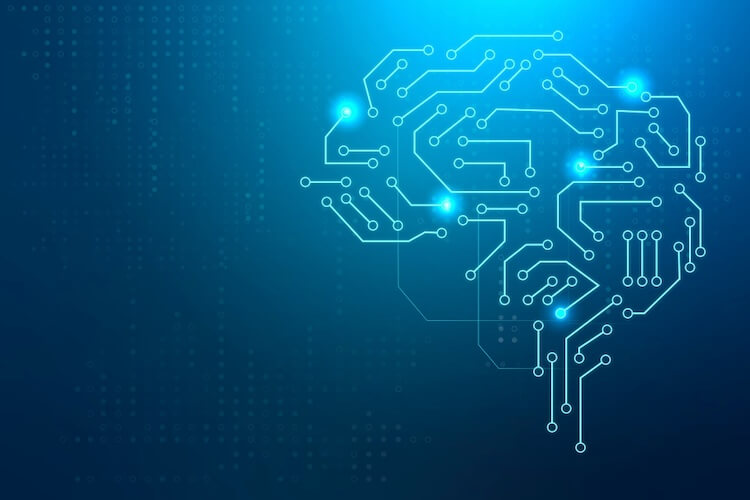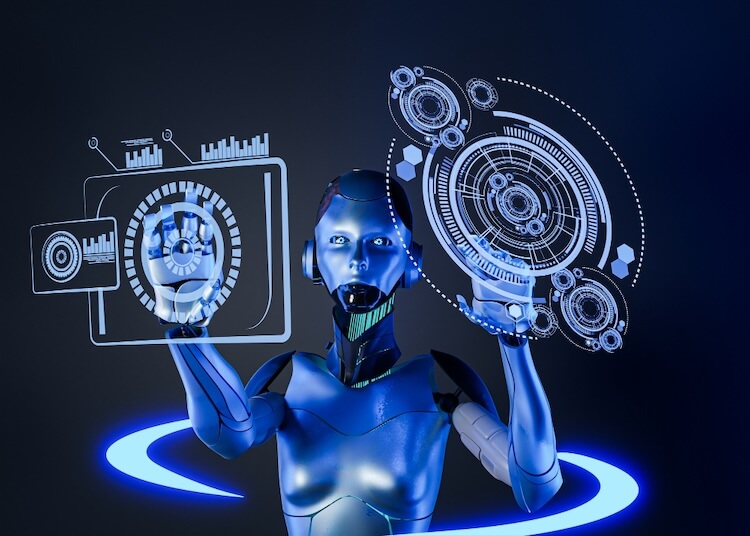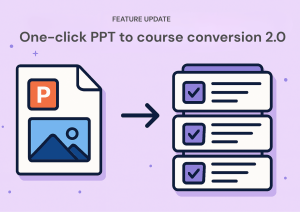
5 Top AI LMS for 2024: Features, Examples, and What Awaits
- Author: Urban Rotar
- Published:

What is an AI LMS?
An AI LMS, or Artificial Intelligence Learning Management System, uses AI technologies like machine learning and natural language processing to personalize learning experiences and improve educational outcomes.
How does AI improve LMS platforms?
AI enhances LMS platforms by analyzing learner data to create personalized learning paths, providing real-time feedback, and adjusting content to match each learner’s progress and needs.
Which AI LMS platforms are recommended for 2024?
Top AI LMS platforms for 2024 include TalentLMS, CourslyAI, Docebo, Zavvy, and EdApp, each offering unique features to enhance learning experiences.
Key Takeaways - AI LMS:
- AI LMS platforms personalize learning paths and improve outcomes using machine learning algorithms and data analysis.
- Top AI LMS for 2024 include TalentLMS, CourslyAI, Docebo, Zavvy, and EdApp.
- AI-powered LMS increase engagement through interactive and adaptive learning experiences.
- AI-driven analytics provide valuable insights, enhancing the effectiveness of training programs.
- The future of e-learning will feature more integration of AI with AR and VR technologies.
What is an AI-Powered Learning Platform?
An AI-powered learning platform is a type of learning management system that uses artificial intelligence to personalize learning experiences. These systems leverage machine learning algorithms to analyze learner data, offering insights that improve learning outcomes. By utilizing AI, these platforms can provide tailored learning paths and immediate feedback, enhancing the overall educational experience. The integration of AI in LMS ensures that each learner’s unique needs and abilities are addressed, making education more effective and engaging.
These platforms don’t just serve as a one-size-fits-all solution; they adapt and grow with the learner. With continuous data analysis, an AI-powered learning platform can pinpoint where a learner might be struggling and adjust the content accordingly. This dynamic adjustment is what sets AI LMS apart from traditional methods, creating a more fluid and responsive learning environment. Moreover, the real-time feedback mechanism helps learners understand their mistakes on the spot, leading to quicker correction and better retention of information.
The use of artificial intelligence in these platforms also opens up the possibility of more interactive and engaging learning experiences. Natural language processing enables the system to engage in conversations with learners, answering questions and providing explanations as if it were a human tutor. This interactivity can make learning more enjoyable and less intimidating, encouraging learners to ask questions and explore topics more deeply. Furthermore, the ability to analyze vast amounts of data allows these systems to continually refine and improve the learning experience, making each session more effective than the last.

Key Features of AI-Powered LMS
AI-powered LMS platforms come with a range of features designed to optimize learning. Key among these are personalized learning paths, which adjust to each learner’s abilities and progress. These paths ensure that learners receive content suited to their needs, enhancing retention and understanding. Machine learning algorithms play a crucial role in this process, analyzing data to offer insights and recommendations for learners and educators alike.
Another vital feature is natural language processing (NLP). NLP allows the system to understand and respond to learner queries, making interactions more intuitive and efficient. This technology can handle a variety of languages and dialects, providing a more inclusive learning environment. Additionally, adaptive learning experiences are a significant benefit of AI-powered LMS. These systems adjust content and difficulty based on the learner’s performance, ensuring that each individual is challenged appropriately.
Engaging courses are another hallmark of AI-powered LMS. These platforms create interactive and immersive learning experiences that keep learners engaged and motivated. By incorporating multimedia elements and interactive activities, AI-powered LMS platforms make learning more enjoyable and effective.
Personalized learning paths are crafted by analyzing each learner’s unique patterns and preferences. This ensures that the content delivered is not only relevant but also in a format that the learner finds most conducive. The machine learning algorithms continually adapt to the learner’s progress, providing insights that help educators fine-tune their approach. These insights can highlight which areas a learner excels in and which require more focus, allowing for a more targeted and effective teaching strategy.
Natural language processing is not just about understanding questions. It can also facilitate conversations that simulate real-life scenarios, providing a more immersive learning experience. For instance, language learning apps can engage users in dialogue, correcting mistakes in real-time and offering contextual advice. This type of interaction helps learners practice and improve their skills in a more practical and engaging manner.
Adaptive learning experiences are designed to keep learners on their toes, neither bored by too-easy content nor overwhelmed by too-difficult material. The system’s ability to adjust the difficulty based on performance means that learners are always working at their optimal level of challenge. This not only improves learning outcomes but also keeps learners motivated and engaged.
Engaging courses leverage multimedia, interactive quizzes, and real-time feedback to create a dynamic learning environment. These elements make the learning process more interactive and less monotonous, increasing the likelihood of knowledge retention. The use of videos, simulations, and gamified elements can make complex concepts more accessible and easier to understand.

Top 5 AI-Powered LMS for 2024
An AI learning platform offers significant advantages over traditional LMS solutions, including versatility in different learning settings, the ability to create engaging content quickly, and the use of AI technologies for personalized learning experiences, content automation, and assessment tools.

TalentLMS
TalentLMS stands out as a top AI-powered learning platform with its personalized learning paths and advanced machine learning algorithms. The user-friendly interface makes it accessible for learners of all levels, while robust reporting tools help administrators track progress effectively. Ideal for corporate training programs, TalentLMS integrates seamlessly with popular HR systems, ensuring a streamlined experience for both learners and administrators.
TalentLMS also offers a wide range of customizable features that cater to different learning styles and organizational needs. Its ability to integrate with various third-party applications allows for a more cohesive and streamlined learning process. For instance, companies can sync TalentLMS with their HR systems to automate user management and track training progress more efficiently. This level of integration not only saves time but also reduces the likelihood of errors and discrepancies in training data.
Furthermore, the platform’s analytics tools provide detailed insights into learner performance, helping organizations identify trends and areas for improvement. These insights can be used to refine training programs, ensuring that they remain effective and relevant. TalentLMS also supports multiple languages, making it suitable for global organizations with diverse workforces. This multilingual support ensures that all employees can access training materials in their preferred language, enhancing their learning experience.
CourslyAI
CourslyAI is a powerful AI-driven platform that excels in delivering personalized learning experiences. Its intuitive design and adaptive learning features make it suitable for a wide range of educational contexts, from corporate training to academic settings. With strong analytics and reporting capabilities, CourslyAI provides valuable insights into learner performance and engagement.
CourslyAI goes a step further by offering features like real-time feedback and predictive analytics. These tools help educators identify potential issues before they become significant problems, allowing for timely interventions. The platform’s ability to adapt to different learning styles and paces makes it an excellent choice for both individual learners and large organizations. CourslyAI’s machine learning algorithms continuously analyze learner data to refine and personalize the learning experience, making each session more effective than the last.
The platform also boasts a comprehensive library of training materials that can be customized to fit specific needs. This flexibility makes CourslyAI a versatile tool for various industries and educational levels. Additionally, its integration with other AI tools enhances its capabilities, providing a more holistic learning experience. For example, CourslyAI can integrate with AI-powered content creation tools to develop personalized training materials quickly and efficiently. This integration not only saves time but also ensures that the content is always up-to-date and relevant.
Docebo
Docebo offers a comprehensive suite of AI-powered features, including adaptive learning experiences and natural language processing. Its mobile-friendly interface ensures learners can access content anytime, anywhere, making learning more flexible and convenient. Docebo’s robust analytics tools help track learner progress and identify areas for improvement, making it ideal for large enterprises with complex training needs.
Docebo also excels in its ability to support social learning. The platform encourages collaboration and interaction among learners, fostering a sense of community and shared learning. This social aspect can enhance the learning experience by allowing learners to share insights, ask questions, and provide feedback to one another. Docebo’s integration with various communication tools facilitates this interaction, making it easier for learners to connect and collaborate.
Additionally, Docebo’s AI-driven analytics provide deep insights into learner behavior and performance. These insights can be used to identify knowledge gaps and tailor training programs accordingly. The platform’s ability to deliver personalized learning paths ensures that each learner receives the support they need to succeed. Docebo’s mobile-friendly design also makes it easy for learners to access training materials on the go, ensuring that learning can happen anytime and anywhere.
Zavvy
Zavvy is tailored for small to medium-sized businesses, offering personalized learning paths and machine learning algorithms to enhance the learning experience. Its user-friendly interface and comprehensive reporting tools make it easy for administrators to monitor progress and effectiveness. Zavvy’s integration with popular HR systems further simplifies the management of training programs.
Zavvy also offers a range of interactive features designed to keep learners engaged and motivated. These include gamified elements, quizzes, and real-time feedback, which make the learning process more dynamic and enjoyable. The platform’s machine learning algorithms continuously analyze learner data to provide personalized recommendations and interventions, ensuring that each learner receives the support they need to succeed.
In addition to its robust features, Zavvy offers a high degree of customization. Organizations can tailor the platform to meet their specific needs, ensuring that the training programs are aligned with their goals and objectives. Zavvy’s integration with HR systems also makes it easier to track and manage employee training, ensuring that all staff members receive the necessary training and support.
EdApp
EdApp combines adaptive learning experiences with natural language processing to create a dynamic and engaging learning environment. Its mobile-friendly design ensures that learners can access content on the go, while robust analytics tools provide insights into learner performance. EdApp is particularly well-suited for corporate training programs, offering a range of integrations with HR systems to streamline training processes.
EdApp also offers a unique feature called “Microlearning,” which breaks down complex topics into smaller, more manageable chunks. This approach makes learning more accessible and less overwhelming, particularly for busy professionals who may not have the time to engage with lengthy training sessions. Microlearning also enhances retention by allowing learners to focus on one concept at a time, reinforcing their understanding before moving on to the next topic.
The platform’s use of natural language processing also enhances the learning experience by providing real-time feedback and support. Learners can ask questions and receive instant answers, making the learning process more interactive and responsive. EdApp’s analytics tools also provide detailed insights into learner performance, helping organizations identify trends and areas for improvement. This data can be used to refine training programs and ensure that they remain effective and relevant.
Benefits of AI-Powered LMS
AI-powered LMS platforms offer numerous benefits, starting with personalized learning experiences. These systems tailor content to each learner’s needs and abilities, ensuring that every student gets the most out of their education. Improved learning outcomes are another significant advantage.
Improved learning outcomes are another significant advantage. By using machine learning algorithms to analyze data, AI-powered LMS platforms can identify areas where learners need additional support and provide targeted interventions. This precise analysis ensures that learners are guided efficiently through their educational journey, reducing the likelihood of gaps in knowledge. The use of artificial intelligence in these platforms ensures that the learning experience is continuously refined and optimized, resulting in higher retention rates and better overall performance.
AI-powered LMS platforms also significantly increase engagement. By creating interactive and immersive courses, these platforms keep learners motivated and invested in their education. Gamification, multimedia elements, and real-time feedback transform the learning process into an engaging experience. This interactive approach helps maintain learner interest, which is crucial for effective learning. Moreover, the immediate feedback mechanism ensures that learners can correct their mistakes on the spot, promoting a deeper understanding of the material.
Cost reduction is another critical benefit of AI-powered LMS. These platforms automate many administrative tasks that traditionally required significant human intervention. For example, AI can handle scheduling, tracking progress, and even grading assessments. This automation not only saves time but also reduces the need for additional administrative staff, lowering operational costs. Additionally, the scalable nature of AI-powered LMS means that organizations can expand their training programs without a proportional increase in costs.
Furthermore, AI-powered LMS platforms offer the flexibility to accommodate various learning styles and paces. This adaptability is essential in today’s diverse educational environments. Whether it’s corporate training programs that need to be tailored to different departments or academic courses that must cater to a wide range of student abilities, AI ensures that the learning experience is optimized for each individual. This personalized approach not only improves learning outcomes but also enhances learner satisfaction and motivation.

How AI-Powered LMS Use Machine Learning
AI-powered LMS platforms utilize machine learning algorithms to analyze learner data and provide insights for improved learning outcomes. These algorithms can identify patterns and trends in learner behavior, allowing the system to offer personalized recommendations and interventions. Natural language processing is another critical component, enabling the system to understand and respond to learner queries in real-time. This interactive capability is akin to having a personal tutor available around the clock, ready to assist with any questions or difficulties learners may encounter.
Predictive analytics is also used to identify areas where learners may need additional support. By analyzing past performance data, the system can predict future learning challenges and offer proactive assistance. This foresight allows educators to address potential issues before they become significant obstacles, ensuring a smoother and more effective learning journey. The use of predictive analytics helps create a more supportive learning environment where learners feel confident and well-equipped to tackle their educational goals.
Adaptive learning experiences are another key feature, with the system adjusting content and difficulty based on the learner’s performance. This means that learners who grasp concepts quickly can move on to more challenging material, while those who need more time can receive additional support. This dynamic adjustment ensures that learners are always working at an appropriate level of difficulty, which enhances engagement and improves learning outcomes. The personalized learning paths crafted by these adaptive systems help maintain a balance between challenge and achievability, fostering a positive and productive learning environment.
Moreover, machine learning algorithms continuously refine the learning experience based on data from previous interactions. This constant iteration means that the system becomes more effective over time, learning from past successes and failures to provide even better support for future learners. The ability to analyze vast amounts of data allows AI-powered LMS platforms to offer a level of personalization and adaptability that is impossible with traditional learning methods.
Choosing the Best AI-Powered LMS
When choosing an AI-powered LMS, it’s important to consider your organization’s specific needs and goals. Evaluate the features of each platform to determine which one best meets your requirements. Reading reviews from other users can also provide valuable insights into the pros and cons of each platform. Requesting a demo is a great way to see the platform in action and determine if it’s the right fit for your organization.
Consider the scalability of the platform. Your chosen AI-powered LMS should be able to grow with your organization, accommodating increasing numbers of learners and more complex training programs. It’s also crucial to look at the integration capabilities of the LMS. The best platforms integrate seamlessly with your existing systems, such as HR or content management systems, to provide a unified and efficient learning environment.
The ease of use of the LMS is another critical factor. A platform with a steep learning curve can hinder adoption and reduce the effectiveness of your training programs. Look for an AI-powered LMS with an intuitive interface that is easy for both learners and administrators to navigate. The availability of robust support and training resources from the vendor can also be a significant advantage, helping your team get up to speed quickly and addressing any issues that arise.
Security is another important consideration. An AI-powered LMS will handle sensitive data, including personal information and learning records. Ensuring that the platform has strong security measures in place to protect this data is essential. Look for features such as encryption, secure login processes, and regular security audits. Additionally, compliance with relevant data protection regulations should be verified.
Finally, cost is always a consideration. While AI-powered LMS platforms can be a significant investment, the benefits they offer in terms of improved learning outcomes, increased engagement, and cost savings from automation can provide a strong return on investment. Compare pricing structures and consider the long-term value offered by each platform.

Future of AI in E-Learning
The future of AI in e-learning looks promising, with AI-powered learning platforms continuing to evolve and improve. Machine learning algorithms will become more sophisticated, allowing for more accurate analysis of learner data. Natural language processing will become more prevalent, making interactions with the system more intuitive and interactive. Additionally, AI-powered LMS platforms will become more integrated with other HR systems, providing a seamless and efficient learning experience.
As AI technology advances, we can expect even more personalized and adaptive learning experiences. Future AI-powered LMS platforms may use deep learning techniques to better understand and predict learner needs, providing highly customized support. These systems could offer real-time adjustments to learning paths, ensuring that each learner receives the most effective education possible.
The integration of AI with augmented reality (AR) and virtual reality (VR) technologies also holds exciting potential. These technologies can create immersive learning environments that simulate real-world scenarios, providing learners with hands-on experience in a safe and controlled setting. AI can enhance these experiences by tailoring them to the learner’s skill level and progress, making the learning process even more engaging and effective.

Moreover, AI-powered LMS platforms will likely become more accessible and user-friendly. Advances in user interface design and natural language processing will make these systems easier to use, encouraging broader adoption across different sectors. The continued development of AI-driven analytics will provide educators with even deeper insights into learner performance, enabling more targeted and effective interventions.
In conclusion, AI-powered LMS platforms offer a range of features and benefits that can significantly enhance the learning experience. From personalized learning paths to adaptive learning experiences, these systems provide a tailored approach to education that meets the unique needs of each learner. As technology continues to advance, AI-powered LMS platforms will become even more effective, making them an invaluable tool for educators and learners alike.



